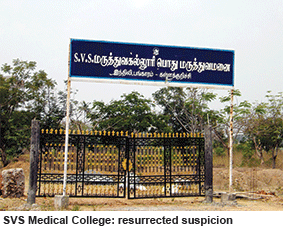 The suicide of three 19-year-old second year women students of the privately promoted SVS Medical College of Yoga and Naturopathy and Research Institute (SVSMCYNRI, estb. in 2008 under the aegis of the SVS Educational and Social Trust) in Villupuram district, Tamil Nadu on January 23, has shocked and angered academics, parents and students across the country. According to the students’ suicide note, they were driven to take this extreme step as their continuous protests against lack of basic infrastructure and faculty in the college had evoked no response. Instead, they were forced into doing menial jobs on campus despite their having paid up tuition fees of Rs.90,000-plus.
The suicide of three 19-year-old second year women students of the privately promoted SVS Medical College of Yoga and Naturopathy and Research Institute (SVSMCYNRI, estb. in 2008 under the aegis of the SVS Educational and Social Trust) in Villupuram district, Tamil Nadu on January 23, has shocked and angered academics, parents and students across the country. According to the students’ suicide note, they were driven to take this extreme step as their continuous protests against lack of basic infrastructure and faculty in the college had evoked no response. Instead, they were forced into doing menial jobs on campus despite their having paid up tuition fees of Rs.90,000-plus.
Following the suicides, the Villupuram police arrested college founder-promoters Vasuki Subramanian, her husband S. Subramanian, their son Sudhakar Varma (also a student of the college) and others, and booked them under several sections of the Indian Penal Code.
The tragic suicides have resurrected suspicions of corruption and the integrity of inspectors and officials of the Tamil Nadu Dr. MGR Medical University which had granted provisional affiliation to SVSMCYNRI from 2008-09 to 2014-15. There are only three private colleges including SVSMCYNRI and one government college in Chennai which offer a five-year undergraduate degree programme — bachelor’s in naturopathy and yogic sciences (BNYS) — in Tamil Nadu. While colleges offering education in ayurveda, siddha and unani medicine are governed by the Central Council of Indian Medicine, colleges offering the BNYS programme are supervised by state governments.
By all accounts, SVSMCYNRI, which has since been closed and its students shifted to the government college in Chennai, had an enrolment of 100 students who joined the college after clearing a state conducted entrance test and counseling session.
Although the state government decreed a tuition fee of Rs.30,000-55,000 per year for the BNYS programme, students were forced to pay fees for three years in advance, under threat of expulsion. However subsequent media investigations have revealed that the college did not have sufficient classrooms, laboratories or hostels and the institute’s 100 students were instructed by two ‘interns’. Senior students were forced to provide cooked meals in a thatched-roof kitchen and all students had to maintain the campus and toilets. Several students who discontinued their course were reportedly forced by the management to pay “hefty sums” for return of original certificates and for transfer certificates. Not a single student is recorded to have graduated from SVSMCYNRI since 2008.
Surprisingly, routine inspections of the college by senior officials and experts of the affiliating Dr. MGR Medical University overlooked glaring infrastructure deficiencies and faculty shortages. This despite numerous petitions sent by hapless students to the Villupuram district collector, the vice chancellor of Dr. MGR Medical University, state health secretary and chief minister Jayalalithaa among others.
“Educational institutions that don’t meet even basic infrastructure requirements are given approval and affiliation and allowed to function after bribes and commissions are paid to government officials and regulatory authorities. The rot in the system can be reversed only by appointing academics of integrity to head universities and regulatory bodies. Moreover, unless complete transparency is brought into the functioning of universities and regulatory bodies to enable students to access information about the reputation of colleges, fees and infrastructure before signing up, fake institutions run by unscrupulous managements will continue to thrive and victimise students,” warns A. Narayanan, social activist and director of the Chennai-based Change India, a centre for research and advocacy.
Several academics opine that the absence of a Central regulatory body to monitor naturopathy and yoga science colleges has encouraged the growth of fraudulent institutions. But this viewpoint is contested by others. “As evidenced by the sorry condition of the Medical Council of India and AICTE, Central government supervision doesn’t put an end to corrupt practices. The suicides at SVSMCYNRI should be a lesson to the state government and affiliating authorities about the dire consequences of casual recognition and affiliation, which is plunging standards downwards and wrecking the higher education system,” says Chidananda Murthy, principal of JSS Institute of Naturopathy and Yogic Sciences (estd. 1997), Coimbatore.
Hemalatha Raghupathi (Chennai)